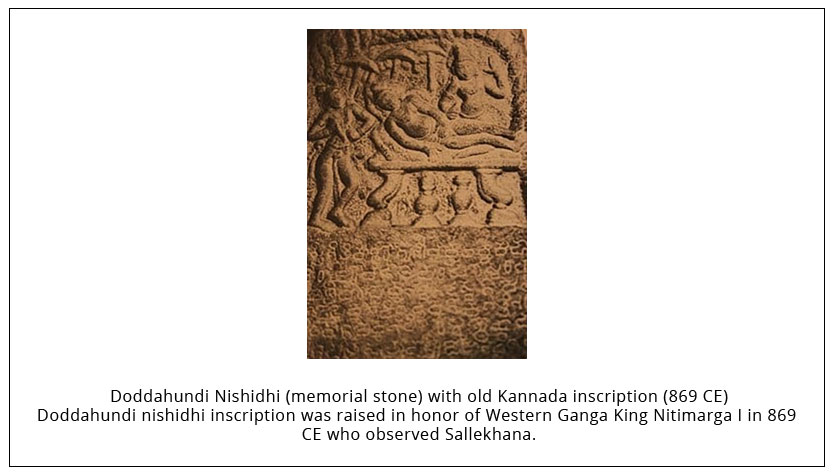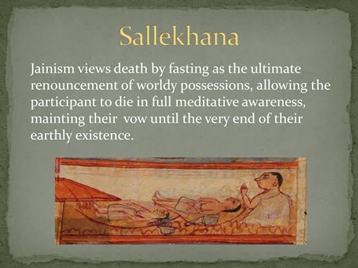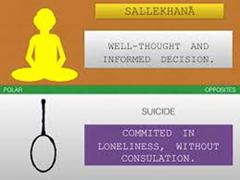Sallekhana in most Religions and Philosophy:
It is not just Jainism, but Hinduism and Buddhism as well, that have many references to Sallekhana. Buddha believed craving for life and desire for death as unethical.
Even though there is no direct reference of Sallekhana in Hinduism, a death which in meaningful points to Sallekhana being definitely endorsed.
- Saint Vinoba Bhave as well accepted this kind of a death for himself. He gave up food and eventually medicines. Upon Indira Gandhi insisting on sending a doctor he replied saying, ‘I have lived consciously all along and would want to die consciously. The name of God is my only medicine now.’
- According to Buddha, BhavTrishna is Jivitasha and VibhavTrishna is maranasha (atichar of Sallekhana).
- Famous Hindi writer Kaka Kalelkar’s book, ‘Paramsakha Mrutyu’ has been published in English. It is titled, ‘Sallekhana is not suicide.’
Prof. Dr. Settar of the “Dharwad University has written the below 2 books in support of Sallekhana-(1) Invited Death and (2) Pursuing Death.
- Maharashtriyan Sant kavi has said- “माझे मरण पाही एले डोला तो झाला सोहला अनुपम्य” means I have seen death by my eyes, this is a great festival.
Types of Sallekhana:
Different types of Sallekhana have been given. Below 3 are the principle types:
- Bhakta Pratyakhyan: Giving up 3 types and 4 types of food and the death resulting out of this is called Bhakt Pratyakhana.
- Inginimaran : Fasting unto death at a certain fixed place is called Ingini Maran.
- Paadpogaman: Death by fasting under a tree. In this type, the one does not serve oneself nor does one lets anyone else serve him.
Importance of Sallekhana:
Jaina tradition has shown the way of Sallekhana. Sallekhana is called the festival of death. Sallekhana involves weakening of the defilements which is internal Sallekhana, while weakening of the body is external Sallkehana. Giving up food and subsequently water weakens the body. A weak body lets the soul leave with ease at the time of death. However, healthy body does not let the soul leave quite easily during death.
It is said in Bhagwati Aradhana that, even if the soul leaves the body peacefully in just even a single paryaya, that soul will not be found in the Sansara for more than 7-8 paryayas.
Acharya Pujyapada in his book ‘Mahotsav’ writes that the merit derived out of Sallekhana death is much more than of serving mahavratas and other austerities.
Who fears death?
The way a student fears examinations because he is not prepared for them, the same way one fears death when one is under prepared for the other world. Therefore, one must start to prepare well in advance rather than to repent during death. The way we prepare ourselves for our journey in this lok (Present Birth), we never prepare ourselves for our journey to the other world. We know that we have to end lives in this lok (Present Birth) and proceed to parlok (Next Birth) or the other world.
Who can accept Sallekhana?
Shraman and Shravaka both can observe Sallekhana. It is foremost amongst the Vratas. It is the best observed at the time of Death. A Sadhaka even after observing the best austerities all through the life, when at the time of death, gets entangled due to Raag and Dwesh, results in failure of his life.
Death is classified as ‘Bal Maran’ and ‘Pandit Marana’. They are further classified into different subtypes. Sallekhana is essential for both, a layman and a monk. As per their capability, they must give up their body for securing Sallekhana.
As per Acharya Kundakunda, Samadhimaran is for a Shramana and Sallekhana is for a householder. However, according to Acharya Umaswami, it is the same for both a layman and a monk.
Some scriptures however also show subtle differences between Sallekhana and Samadhi Marian, such as in Ratanakand Shravakachar by Acharaya Samantabhadara.
When to observe Sallekhana?
- When afflicted by an incurable disease.
- Upsarga done by a human, nature or animals.
- Under circumstances when one fears the loss of character / dignity.
- Old age and impending death.
- On the body and senses getting weak.
Before accepting Sallekhana, one should gain knowledge about his own death. Shwetambara Acharyas have shown many ways to know of death. By using Amnay of the updeshmala, the time of death can be known.
Sallekhana needs practice to make it successful:
Sallekhana requires daily practice for making it successful. At night, at the time of sleep one should ask for pardon and forgiveness to all beings. Then the sagari santhara vow is taken, known as santhara poursi. Sagari means (no compulsion), one can continue his daily routine the next day. A person may not wake up at all in the morning. The purpose for this vow is to remain vigilant since one cannot be sure of death. Thus Sallekhana can be taken on both temporary and permanent basis. Temporary basis is taken when circumstances are not congenial and also on a daily basis as mentioned above, and there is a permanent santhara which lasts till one’s life. The greatest significance of these vows is that by practicing these vows, a layman virtually participates to a limited extent and for a limited period of time in the routine of an ascetic, without actually renouncing the world. It is obvious that such practices maintain a close tie between the laymen and ascetics, as both are actuated by the same motive and are moved by the same religious ideals.
Sallekhana is not Suicide:
Suicide is committed due to compelling circumstances whereas Sallekhana is voluntarily observed. In observing Sallekhana, there is death of desires, whereas in suicide there is an unfulfilled desire. A veer or brave person embraces death as his friend.






well written post.
[…] tadalafil 20 mg pill […]
[…] tadalafil sandoz 20 mg prix […]
[…] tadapox (cialis 20mg with dapoxetine 60mg […]
[…] colchicine tablets shelf life […]
[…] buy diltiazem hydrochloride 2 cream […]
[…] prilosec buy 2 save $25 […]
[…] buy topamax canada […]
[…] discount generic nexium […]
[…] diclofenac tabletten dosierung […]
[…] januvia global sales […]
[…] depakote 250mg […]
[…] cheapest generic flomax […]
[…] buy synthroid online pharmacy […]
[…] lasix buy uk […]
[…] mail order allegra […]
[…] cialis 20 gramos […]
[…] amlodipine generic […]
[…] buy crestor in canada […]
[…] order neurontin no prescription […]
[…] cheapest cialis 20mg online […]
[…] cheap prednisolone […]
[…] cheap prescriptions singulair […]
[…] tadalafil 20mg price cvs […]
[…] lowest price on cialis […]
[…] best price cialis 20mg vipps […]
[…] 20 mg tadalafil cost […]
[…] roulette […]
[…] order lasix water pill […]
[…] generic claritin […]
[…] fml forte price […]
[…] cheap decadron […]